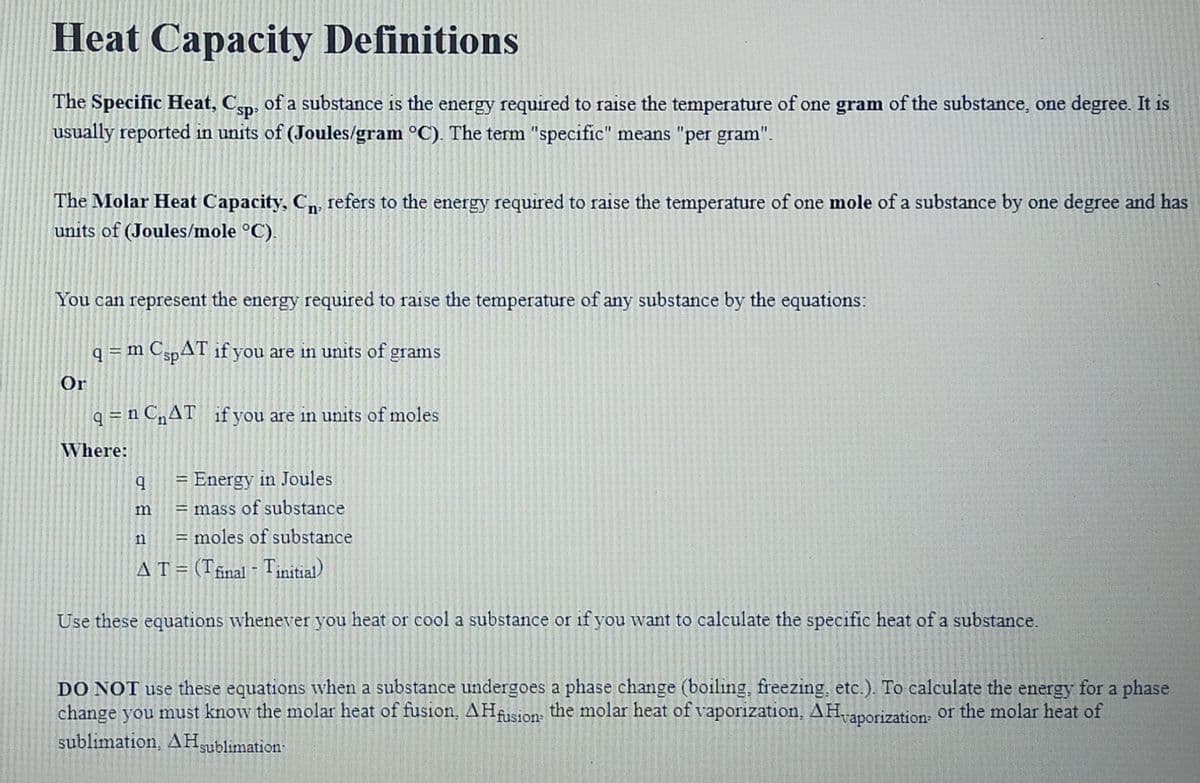In the laboratory a student finds that it takes 3.25x10 Joules to increase the temperature of 14.3 grams of gaseous hydrogen from 20.2 to 37.4 degrees Celsius. The specific heat of hydrogen calculated from her data is | J/g°C.
In the laboratory a student finds that it takes 3.25x10 Joules to increase the temperature of 14.3 grams of gaseous hydrogen from 20.2 to 37.4 degrees Celsius. The specific heat of hydrogen calculated from her data is | J/g°C.
Introduction to Chemical Engineering Thermodynamics
8th Edition
ISBN:9781259696527
Author:J.M. Smith Termodinamica en ingenieria quimica, Hendrick C Van Ness, Michael Abbott, Mark Swihart
Publisher:J.M. Smith Termodinamica en ingenieria quimica, Hendrick C Van Ness, Michael Abbott, Mark Swihart
Chapter1: Introduction
Section: Chapter Questions
Problem 1.1P
Related questions
Question

Transcribed Image Text:Heat Capacity Definitions
The Specific Heat, Csp.
of a substance is the energy required to raise the temperature of one gram of the substance, one degree. It is
usually reported in units of (Joules/gram °C). The term "specific" means "per gram".
The Molar Heat Capacity, Cn refers to the energy required to raise the temperature of one mole of a substance by one degree and has
units of (Joules/mole °C).
You can represent the energy required to raise the temperature of any substance by the equations:
q = m CspAT if you are in units of grams
Or
q = fn C„AT if you are in units of moles
Where:
= Energy in Joules
m
= mass of substance
n
moles of substance
AT= (Tinal - Tinitial)
Use these equations whenever you heat or cool a substance or if you want to calculate the specific heat of a substance.
DO NOT use these equations when a substance undergoes a phase change (boiling, freezing, etc.). To calculate the energy for a phase
change you must know the molar heat of fusion, AHfusion the molar heat of vaporization, AH aporization: or the molar heat of
sublimation, AHublimation-

Transcribed Image Text:In the laboratory a student finds that it takes 3.25x103 Joules to increase the temperature of 14.3 grams of gaseous hydrogen from 20.2 to
37.4 degrees Celsius.
The specific heat of hydrogen calculated from her data is
|J/g°C.
Expert Solution
This question has been solved!
Explore an expertly crafted, step-by-step solution for a thorough understanding of key concepts.
This is a popular solution!
Trending now
This is a popular solution!
Step by step
Solved in 4 steps

Knowledge Booster
Learn more about
Need a deep-dive on the concept behind this application? Look no further. Learn more about this topic, chemical-engineering and related others by exploring similar questions and additional content below.Recommended textbooks for you

Introduction to Chemical Engineering Thermodynami…
Chemical Engineering
ISBN:
9781259696527
Author:
J.M. Smith Termodinamica en ingenieria quimica, Hendrick C Van Ness, Michael Abbott, Mark Swihart
Publisher:
McGraw-Hill Education

Elementary Principles of Chemical Processes, Bind…
Chemical Engineering
ISBN:
9781118431221
Author:
Richard M. Felder, Ronald W. Rousseau, Lisa G. Bullard
Publisher:
WILEY

Elements of Chemical Reaction Engineering (5th Ed…
Chemical Engineering
ISBN:
9780133887518
Author:
H. Scott Fogler
Publisher:
Prentice Hall

Introduction to Chemical Engineering Thermodynami…
Chemical Engineering
ISBN:
9781259696527
Author:
J.M. Smith Termodinamica en ingenieria quimica, Hendrick C Van Ness, Michael Abbott, Mark Swihart
Publisher:
McGraw-Hill Education

Elementary Principles of Chemical Processes, Bind…
Chemical Engineering
ISBN:
9781118431221
Author:
Richard M. Felder, Ronald W. Rousseau, Lisa G. Bullard
Publisher:
WILEY

Elements of Chemical Reaction Engineering (5th Ed…
Chemical Engineering
ISBN:
9780133887518
Author:
H. Scott Fogler
Publisher:
Prentice Hall


Industrial Plastics: Theory and Applications
Chemical Engineering
ISBN:
9781285061238
Author:
Lokensgard, Erik
Publisher:
Delmar Cengage Learning

Unit Operations of Chemical Engineering
Chemical Engineering
ISBN:
9780072848236
Author:
Warren McCabe, Julian C. Smith, Peter Harriott
Publisher:
McGraw-Hill Companies, The